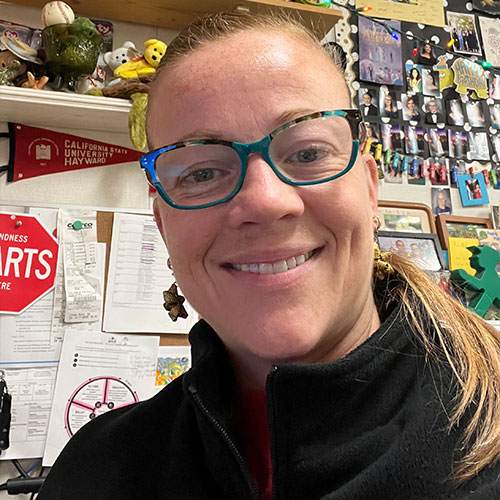
Barbara Andersen
Barbara Andersen is a German teacher at Castro Valley High School in Castro Valley, California. She has been traveling with her students for almost the entire two decades she has been a teacher. All of her travels are non-school sponsored trips, as when she first took over the German program 21 years ago, she was told that GAPP (the German-American Partnership Program, exchange program) would not be allowed to continue. Andersen waited a few years and then started planning summer trips with students outside of school hours. She has planned 8 and goes every other year, with the next trip happening this year on June 3!
Why are you passionate about student travel?
I feel strongly that in order to truly understand a culture one must immerse themselves in that culture. I can discuss the cultural differences in class but it is not the same as experiencing them first-hand. I also really believe that by traveling, the world becomes a smaller place and students are able to build empathy and understanding toward others.
What is a major highlight from any of your student travel experiences?
I think a major highlight is hearing all of the stories that my students tell from their experiences abroad. Some try to order in the language, others meet people along the way. I also plan an excursion to a local high school or elementary school each time and that is always a highlight. On our last trip we visited a group of 1st graders. I teach high school and so watching these two groups come together was so heartwarming. My kids played with them during recess outside and they read books to each other. The little ones cried when their high school friends had to leave. I also once had a student that came on the trip that really wanted to experience it all. We went to Dachau (former German concentration camp) and we lost him. Not really lost, but he was not with a group. He finally rejoined us later that day and he was barefoot. And when I asked him why he had taken off his shoes he told me that he wanted to know “what it felt like for the Jewish people that were being held here”. These moments don’t happen without traveling.
What is the greatest lesson you or your students have learned from your trips?
I think my students seem to think that all Germans wear Lederhosen and eat Pretzels all day. My students realize that most stereotypes are not the daily truth. When they meet other kids their age, they learn that German teens have the same daily troubles as American teens. The lesson of learning about a culture from firsthand experience versus hearsay is huge.
How do you try to tie your travel experiences back into the classroom?
To be honest, I don’t plan them back into my lesson; they just appear. For example, my German 3 students read a book that is set in Berlin. Well, we see all of the places listed in the book. Each lesson from our textbook is based on a German speaking city and so if we had visited that city then the kids would have a lot to discuss. My AP German students have to answer cultural questions on the AP exam and again, having visited places and experiencing the culture makes it a lot easier to answer those questions.
From the Nominator:
What qualities make this nominee, both as an educator and travel leader, deserving of this award?
Barbara is an incredibly positive force in our department and on campus. She looks at new situations and challenges with an attitude that is genuine, caring, and optimistic. As someone who collaborates with her on a consistent basis, I see how she continually updates her curriculum and pedagogy to serve the students in this ever changing world. She wants her students to be the best German speakers, as well as best people, that they can be. Through this goal she provides her students with challenging material and then helps them achieve the high expectations. An asset as to teachers and students is her straightforward demeanor—there is little confusion about where she stands. Her voice is one of confidence but also humility, a balance not easily attained. While raising two young children, she has time to work with students when they need it, as well as support colleagues. Barbara is willing to reflect on her teaching and interactions when considering new viewpoints, whether they are conversations about race, equity, or other difficult topics. She pushes herself, and in turn inspires others to do the same. Our department, 900 hall, and school would not
